History
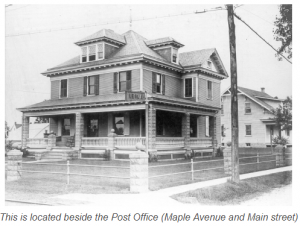 The history of Upper Leacock Township can be traced to the beginnings of the Commonwealth of Pennsylvania and the formation of the original seventeen townships of Lancaster County. In 1729, when Lancaster County was organized, Upper Leacock Township was included in Leacock Township. The pioneer citizens of the territory felt this extensive spread of land was too large for effective communication and government and, they petitioned the Lancaster County Court for the formation of a new township to be called Upper Leacock Township. This petition was granted which created the Township which is bounded by the Conestoga Creek on the west, East Lampeter Township on the south, the Pequea Creek on the east, and West Earl Township on the north. It consists of approximately 17 square miles of rich agricultural land.
The history of Upper Leacock Township can be traced to the beginnings of the Commonwealth of Pennsylvania and the formation of the original seventeen townships of Lancaster County. In 1729, when Lancaster County was organized, Upper Leacock Township was included in Leacock Township. The pioneer citizens of the territory felt this extensive spread of land was too large for effective communication and government and, they petitioned the Lancaster County Court for the formation of a new township to be called Upper Leacock Township. This petition was granted which created the Township which is bounded by the Conestoga Creek on the west, East Lampeter Township on the south, the Pequea Creek on the east, and West Earl Township on the north. It consists of approximately 17 square miles of rich agricultural land.
Among some of the early pioneers to the Township were the Bushongs, Carpenters, Weidlers, Buckwalters, Groffs and Mixels. One of the earliest settlers of the Township was Emanuel Carpenter who moved into the region in 1723 and settled along the boundaries between West Earl and Upper Leacock Townships. He became one of the area's leading citizens and was a member of the Provincial Assembly starting in 1756.
Leacock (formerly known as Mechanicsburg) is said to have been named for a place in Ireland by the same name. The first house in the town was once occupied as the residence of Rev. Samuel Trumbauer, and was originally dedicated as a cake, candy and drug shop. The oldest recorded deed in the town is to the D.B. Landis farm, dated May 5, 1736. Dr. Isaac Weidler was the first physician to set up practice in Mechanicsburg in 1825. He continued his medical practice in the township for fifty years. In 1850, a pottery business was erected in the triangle that is formed by New Holland Turnpike and Newport Road.
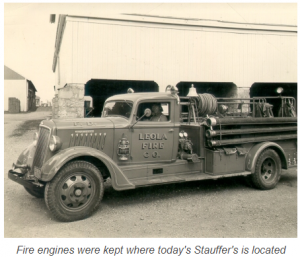 Bareville was originally founded by Andrew Bare in 1780. Bare's father, John Henry Bare, received a grant to the land from the Penn family in 1764. Eventually, Andrew Bare bought the Hans Good farm and erected the first substantial house and barn in Bareville. On this property, Bare started one of the first distilleries in the country. In fact, the leading business occupation of the farmers of this township, in the late 1700's and early 1800's, was the distilling of spirits. Excesses of wheat and corn were more readily shipped to market in the form of distilled spirits. It has been said that the best spirits sold went for as low as eighty five cents per gallon.
Bareville was originally founded by Andrew Bare in 1780. Bare's father, John Henry Bare, received a grant to the land from the Penn family in 1764. Eventually, Andrew Bare bought the Hans Good farm and erected the first substantial house and barn in Bareville. On this property, Bare started one of the first distilleries in the country. In fact, the leading business occupation of the farmers of this township, in the late 1700's and early 1800's, was the distilling of spirits. Excesses of wheat and corn were more readily shipped to market in the form of distilled spirits. It has been said that the best spirits sold went for as low as eighty five cents per gallon.
Leola, originally called Batten's Corner, was a part of Bareville and did not become a separate community until June 10, 1896. The naming of the village of Leola involved considerable controversy. The residents wanted to name the village Glenolde or Glenola, but this name conflicted with other names of existing stations along the railroad. The word "Leola"' was a compromise. The first syllable Le - was taken from the word Leacock and the last two syllables - ola from the word Glenola.
The Democratic administration of Grover Cleveland would not honor the name for the community post office in this Republican stronghold. Finally, in 1896, the controversy ended and the village was officially named Leola. Henry M. Stauffer was appointed Post Master of the Leola Post Office.
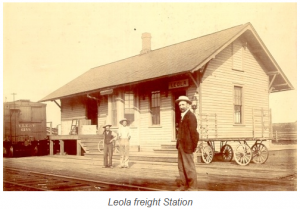 Although Pennsylvania did not pass a bill requiring public education until 1850, the citizens of Bareville established a private school for the community in 1802 and continued to use a one-room log cabin for a school house until 1850. At that time a two-room brick structure was erected and this structure was used until 1910. Within the Township, a common school system did not begin until 1847 when the first board of school directors was elected. The new school board levied a tax on taxable property and inhabitants and appointed a tax collector. Unfortunately, the tax collector was unable to collect any of the taxes for two years since the sentiment of the township was opposed to the idea. As a result of this failure, the entire school board resigned. A new school board was appointed by the court, but the results were the same. Finally, by action of the State Supreme Court, a new school board was elected in the Spring of 1849. This board was successfully able to levy and collect the first school tax and institute a teacher salary of $20/month for six months of work.
Although Pennsylvania did not pass a bill requiring public education until 1850, the citizens of Bareville established a private school for the community in 1802 and continued to use a one-room log cabin for a school house until 1850. At that time a two-room brick structure was erected and this structure was used until 1910. Within the Township, a common school system did not begin until 1847 when the first board of school directors was elected. The new school board levied a tax on taxable property and inhabitants and appointed a tax collector. Unfortunately, the tax collector was unable to collect any of the taxes for two years since the sentiment of the township was opposed to the idea. As a result of this failure, the entire school board resigned. A new school board was appointed by the court, but the results were the same. Finally, by action of the State Supreme Court, a new school board was elected in the Spring of 1849. This board was successfully able to levy and collect the first school tax and institute a teacher salary of $20/month for six months of work.
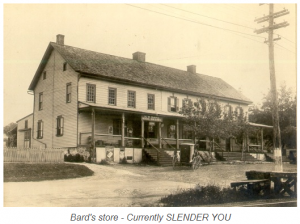 In Upper Leacock Township, along Horseshoe Road, stands "Salem Hellers Reformed Church". The congregation was founded in 1722 by German Reformed families. The first meeting house was a log cabin erected in 1722 on the same spot that is now occupied by Salem Hellers United Church of Christ. The log cabin church had no floor, and the seats were slabs of lumber with the flat side turned up. Located in the cemetery adjacent to the present church building are numerous tombstones in German language dating back to 1729. This was the first Reformed Church in Lancaster County, and possibly one of the first in America. The Zion Lutheran Church of Leacock had its origin in the Salem Hellers Church and formed a part of that congregation until 1816 when Rev. Samuel Trumbauer formed a permanent organization of the Lutheran people. Prior to 1861, the United Brethren sect and the Methodists were organized in one class without being recognized by any conference. Eventually, the two groups separated and formed their own congregations. The United Brethren built their first church in Monterey, and the Methodists established a church along the New Holland Pike, west of Bareville. Other religious groups of the area included the Mennonites, the New Mennonites, the Amish or Hooker Mennonites and the Dunkers (German Baptist).
In Upper Leacock Township, along Horseshoe Road, stands "Salem Hellers Reformed Church". The congregation was founded in 1722 by German Reformed families. The first meeting house was a log cabin erected in 1722 on the same spot that is now occupied by Salem Hellers United Church of Christ. The log cabin church had no floor, and the seats were slabs of lumber with the flat side turned up. Located in the cemetery adjacent to the present church building are numerous tombstones in German language dating back to 1729. This was the first Reformed Church in Lancaster County, and possibly one of the first in America. The Zion Lutheran Church of Leacock had its origin in the Salem Hellers Church and formed a part of that congregation until 1816 when Rev. Samuel Trumbauer formed a permanent organization of the Lutheran people. Prior to 1861, the United Brethren sect and the Methodists were organized in one class without being recognized by any conference. Eventually, the two groups separated and formed their own congregations. The United Brethren built their first church in Monterey, and the Methodists established a church along the New Holland Pike, west of Bareville. Other religious groups of the area included the Mennonites, the New Mennonites, the Amish or Hooker Mennonites and the Dunkers (German Baptist).
U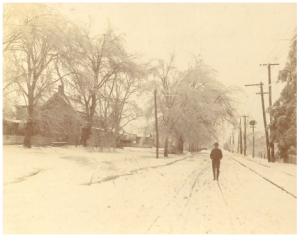 ntil recently there were separate Post Offices in Bareville, Leola and Leacock. As time has passed, the three villages have grown closer together and have progressed to the point where the three towns have merged into one community called Leola. For more than two hundred years, our ancestors have inhabited parts of this county. Some were progressive minded souls who saw the need for industry, schools and community cooperation. Others were content to maintain the status quo and not advance with the times. By cooperation and understanding, we will be able to reconcile the problems that face us now, and those that must be addressed in the future.
ntil recently there were separate Post Offices in Bareville, Leola and Leacock. As time has passed, the three villages have grown closer together and have progressed to the point where the three towns have merged into one community called Leola. For more than two hundred years, our ancestors have inhabited parts of this county. Some were progressive minded souls who saw the need for industry, schools and community cooperation. Others were content to maintain the status quo and not advance with the times. By cooperation and understanding, we will be able to reconcile the problems that face us now, and those that must be addressed in the future.
(Material obtained from Upper Leacock Township Comprehensive Plan - 1988, and "A History of Lancaster County, Pennsylvania" by E Ellis and S. Evans, copyrighted 1883.)
Thanks to the Bareville, Leola Leacock Township Lions Club for permission to use the historical sketch on the Upper Leacock Township website.

